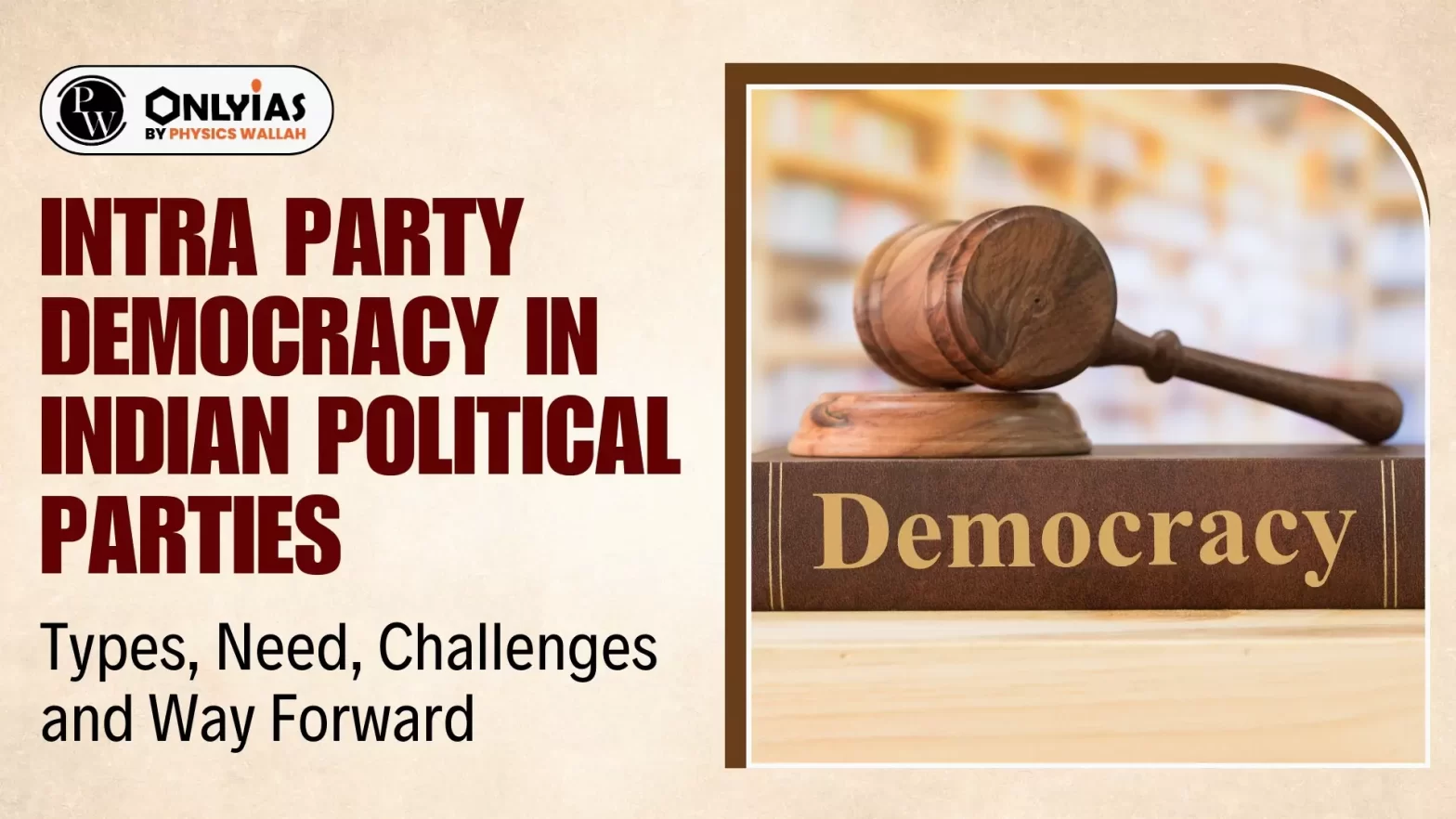Context:
This editorial is based on the news “Ajit Pawar cites reason of dumping uncle Sharad Pawar’s NCP” which was published in the India Today. The roots of the most pertinent challenges faced by Indian politics today can be traced to the lack of intra party democracy in candidate selection and party elections.
Types of Democracy
Democrati theory includes both procedural and substantive democracy.
-
- Practice of universal adult franchise, periodic elections, secret ballot.
-
- refers to the internal democratic functioning of the parties, which purportedly represent the people.
Need For Intra Party Democracy in Indian Political Parties
Intra party democracy in Indian political parties is essential for fostering internal accountability, inclusive decision-making, and the overall health of the democratic process within political organizations. Indian political parties require intra party democracy for the following reasons:
-
- The absence of intra party democracy has contributed to political parties becoming closed autocratic structures.
- This impacts the constitutional right of all citizens to equal political opportunity to participate in politics and contest elections.
-
- A leader with strong grassroot connection would not be sidelined. This will allow less factionalism and division of parties.
-
- In party structure and processes will allow proper ticket distribution and candidate selection.
- The selection of the candidates will represent the choice of the larger party.
-
- A democratic party will be accountable to its party members, for they will lose elections in the next cycle for their shortcomings.
-
- Political parties with units at state and local levels enable the establishment of power centres at various tiers.
- This promotes decentralisation of authority and facilitating decision-making at the grassroots.
-
Criminalization of Politics:
-
- Lack of a clear ticket distribution process based on winnability has resulted in candidates with criminal backgrounds running for elections.
Some Recommendations
- Law Commission of India: In its 170th report, emphasises for laws on internal party democracy.
- NCRWC Report: Need for comprehensive legislation regulating the registration and functioning of political parties or alliances of parties in India.
- Second Administrative Reforms Committee (ARC) Report: highlighted that corruption stems from over-centralization, as greater distance between authority and accountability occurs when power is exercised remotely from the people.
|
Reasons For Intra Party Democracy Deficit in Indian Political Parties
- Dynasty politics: Intra party democracy deficit fuels nepotism, as senior leaders appoint their relatives for elections, establishing succession plans for family constituencies.
- Centralised structure of Political Parties: Centralised party functioning and the strict 1985 anti-defection law discourage legislators from voting based on personal preferences in national and state legislatures.
- Lack of Law: India lacks explicit internal democratic regulations for their political parties.
- Personality cult: Hero worship often leads to leaders taking control of parties, eroding intra party democracy. Examples: Mao Zedong in China and Donald Trump in the USA hijacking their respective parties.
- Easy to subvert internal elections: Established power centres can manipulate internal processes to consolidate and preserve the status quo unquestionably.
Way Forward to Foster Intra Party Democracy
- Law to Compulsify Elections: The political party is obligated to conduct elections at all levels, with national and state-level elections overseen by observers appointed by the Election Commission of India (ECI).
- Amending Anti Defection Law: The 1985 Anti-Defection Act mandates legislators to follow the party whip, limiting internal dissent.
- To enhance party democracy, the anti-defection law could focus on disqualification only for voting against the party whip during critical events like no-confidence motions.
- Reservation: Seats can be reserved for women and members of the backward community including minorities.
- Financial transparency/Audit: All political parties should be compelled to submit their expenditure statements to the ECI within the stipulated time frame.
- Failure to comply with submission deadlines or prescribed formats should result in significant penalties.
- Empowering ECI: The ECI shall be competent to inquire into allegations of non- compliance of any of the provisions requiring elections.
- Penalties for non compliance: ECI should have the penal power to deregister a party until free and fair elections in the party are conducted.
Also Read: Article 142 of Indian Constitution and Its Relation to Judicial Activism and Judicial Restraint (On Chandigarh Mayor Elections)
| Prelims PYQ (2021):
We adopted parliamentary democracy based on the British model, but how does our model differ from that model?
1. As regards legislation, the British Parliament is supreme or sovereign but in India, the power of the Parliament to legislate is limited.
2. In India, matters related to the constitutionality of the Amendment of an Act of the Parliament are referred to the Constitution Bench by the Supreme Court.
Select the correct answer using the code given below.
(a) 1 only
(b) 2 only
(c) Both 1 and 2
(d) Neither 1 nor 2
Ans: (c) |
![]() 27 Feb 2024
27 Feb 2024

